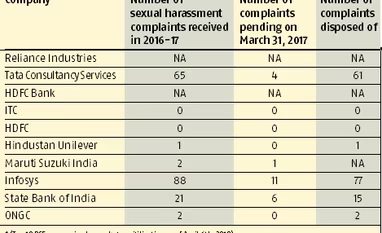On April 22, 2013, the President gave assent to the Sexual Harassment of Women at Workplace (Prevention, Prohibition and Redressal) Act, popularly referred to as the POSH Act. It came into effect in December 2013. Five years on, there is greater awareness and visibility for unequal gender power structures at the workplace. For India Inc, the response to the law has been mixed. Sectors such as IT and banking, among others, have done well in terms of complying with the law, say lawyers and HR experts. However, sectors like media, retail and hospitality require more work and intervention.
As a piece of legislation, the Act is a monumental shift in addressing sexual harassment at workplace. Prior to this, for about 15 years, guidelines laid down by the Supreme Court in the Vishaka vs State of Rajasthan case were the only protection accorded to employees.
A toolkit on best practices for sexual harassment at workplace published in March 2018 by Nasscom, Trilegal and Parity Consulting specifically in the IT-BPM sector brought out the complexities companies could face while complying with the law. These include dealing with complaints filed beyond the six-month limitation period, addressing anonymous complaints, and what to do if complainants approach directly to managers or HR personals, instead of the Internal Complaints Committee (ICC) required to be set up under the law, points out Kalpana Tatavarti, founder-director, Parity Consulting and Training.
Setting up an unbiased committee and ensuring the entire process is conducted in a proper manner are some of the major concerns for companies under this law. A key issue that corporates have to address while setting up an ICC is to have properly trained members who understand nuances of evidence and procedure. Their role as investigator is crucial to the mechanism being effective.
“You need good investigators. More often than not, there is no hard evidence (in these cases), so there is a need to ask the right questions,” says Swarnima, counsel at Trilegal. Experts say training for these people becomes imperative for implementing the law in any workspace. There is also no provision that requires regular or periodic inspections. “Other labour laws have spot inspections. Unfortunately, this law doesn’t provide for a periodical inspection by a regulatory authority,” says Pooja Ramchandani, partner, labour and employment practice, Shardul Amarchand Mangaldass & Co.
To be sure, the law requires companies to submit annual reports detailing the number of sexual harassment cases filed and action taken by the district officers. There is also a penalty attached for failing to comply. Yet, implementation of regular checks remains a concern.
To encourage compliance in companies, the Ministry of Woman and Child Development announced the SHe-box (Sexual Harassment electronic Box) that allows women working in either government or private sectors to directly write in their complaints. This is particularly effective when there is no IC set up in the company. What will ensure compliance from companies, according to Ramchandani, is a proposed amendment to the Companies Act, 2013 regarding mandatory disclosure requirements on the company’s ICs. “When that happens, most of the companies will take it more seriously,” she adds.
Stringent provisions of anti-retaliation measures, which protect complainants from adverse actions of respondents, are also needed. “According to a survey conducted by Indian National Bar Association between April and October 2016, 69 per cent of the victims did not complain due to the fear of retaliation. Our view is that the Act should be amended to lay down provisions that clearly mandate, stringent anti-retaliatory guidelines and consequences of non-compliance,” says Antony Alex, CEO, Rainmaker, a firm that offers anti-sexual harassment training solutions to corporates.
Lack of clarity in the law regarding issues like whether the independent external member has to be present at each meeting (similar to the presiding officer), as well as how the powers of a civil court given to the IC will work still have to be addressed, according to Sana Hakim, partner, POSH at Work, that organises sexual harassment related training sessions and workshops in companies. “These bring in a lot of ambiguity. Amendments in that regard will help,” she adds.
Given the nature and sensitiveness of the cases, concerns regarding management interfering with the decision of the IC or organisations wary of taking action against senior level employees who are considered to be assets to the company continue. Another concern that is seen among companies is the gendered nature of the law. According to Tatavarti, internal company policies work better when they are gender neutral. Hakim adds that in the long run, making the law gender neutral would be a positive move.
Unlock 30+ premium stories daily hand-picked by our editors, across devices on browser and app.
Pick your 5 favourite companies, get a daily email with all news updates on them.
Full access to our intuitive epaper - clip, save, share articles from any device; newspaper archives from 2006.
Preferential invites to Business Standard events.
Curated newsletters on markets, personal finance, policy & politics, start-ups, technology, and more.
)